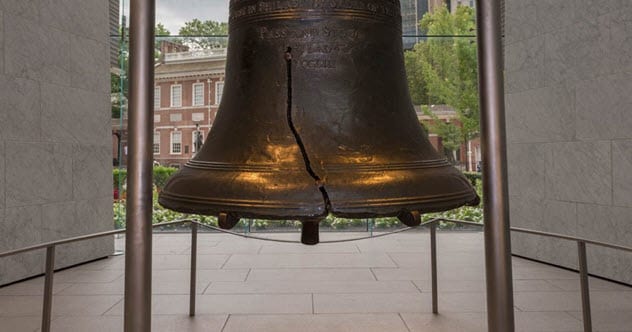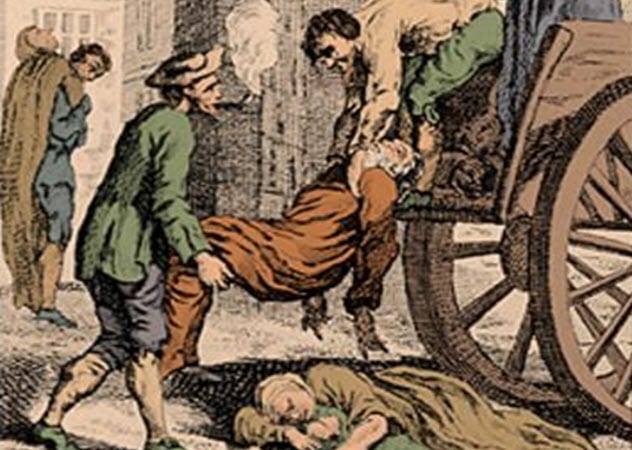 Weird Stuff
Weird Stuff  Weird Stuff
Weird Stuff  Animals
Animals 10 Inspiring Tales of Horses Being Human
 Mysteries
Mysteries Top 10 Haunting Facts About the Ghost Ship MV Alta
 History
History 10 Surprising Stories About the Texas Rangers
 Humans
Humans 10 Philosophers Who Were Driven Mad by Their Own Theories
 Miscellaneous
Miscellaneous 10 Video-Game-Worthy Weapons and Armors from History
 Weird Stuff
Weird Stuff 10 Psychics Who Accurately Predicted Wartime Events
 The Arts
The Arts 10 Pieces of Art Inspired by a Broken Heart
 Health
Health 10 Science Fiction-Sounding New Medical Treatments
 History
History 10 Surprising Facts About the Father of Submarine Warfare
 Weird Stuff
Weird Stuff 10 Times Real Laws Were Based on Bizarre Hypotheticals
 Animals
Animals 10 Inspiring Tales of Horses Being Human
 Mysteries
Mysteries Top 10 Haunting Facts About the Ghost Ship MV Alta
Who's Behind Listverse?

Jamie Frater
Head Editor
Jamie founded Listverse due to an insatiable desire to share fascinating, obscure, and bizarre facts. He has been a guest speaker on numerous national radio and television stations and is a five time published author.
More About Us History
History 10 Surprising Stories About the Texas Rangers
 Humans
Humans 10 Philosophers Who Were Driven Mad by Their Own Theories
 Miscellaneous
Miscellaneous 10 Video-Game-Worthy Weapons and Armors from History
 Weird Stuff
Weird Stuff 10 Psychics Who Accurately Predicted Wartime Events
 The Arts
The Arts 10 Pieces of Art Inspired by a Broken Heart
 Health
Health 10 Science Fiction-Sounding New Medical Treatments
 History
History 10 Surprising Facts About the Father of Submarine Warfare
Top 10 Backstories For Popular Idioms
Let’s face it: English is a weird language. It’s messy, it’s chaotic, and the rules sometimes just straight-out make no sense. There’s plenty of peculiarities built into our grammar rules and everyday expressions, many of which make next to no sense, to the frustration of many individuals trying to learn English for the first time.
However, the greatest offender in terms of sheer bewildering incomprehensibility would surely be the idiom. How could it not be? The idiom is by definition a phrase that cannot be understood literally—you simply have to know the meaning, which seldom, if ever, appears to possess any logical connection to the literal words used. How exactly does the literal phrase “raining cats and dogs” logically translate to “it’s raining really hard,” after all? It doesn’t. Or at least, it doesn’t seem to.
The thing about most of these bizarre quirks of language is that we typically lack the context necessary to make any real sense out of them. But that doesn’t mean that the sense isn’t there, only that we are far enough removed from the original time and culture that the phrase traces back to that it sounds strange to our ears. Once we add the correct context, fill in the backstory, then it often makes much more sense. And if it doesn’t make more sense…well, at least it’s probably a good story.
Top 10 Weird Histories Behind English Words
10 Take a Rain Check

This idiom dates back to the late nineteenth century. The expression originates, believe it or not, in sports—specifically, in 1870s baseball. At that time, if a baseball game was rained out, the relevant teams would reissue tickets for the delayed game. These tickets became known as rain checks. By the 1890s, the phrase had begun to be used in a less exactly literal manner, with the eventual end result that we now use take a rain check in all sorts of situations that don’t have anything whatsoever to do with baseball.
9 Pardon my French

Pardon my French is another exceedingly common phrase, despite the fact that it really doesn’t make very much objective sense. This phrase is generally used as when someone swears, which is then followed by a remark of “Oh, pardon my French.” Of course, whatever was just said is pretty much guaranteed to have not been said in French—usually it’s just in plain old English. But then, why apologize for one’s French? Well, because when the phrase was first coined, the speaker actually was speaking French.
Apparently, back in the 1800s, it was common for the educated to slip little French phrases into their speech. However, the less educated would not have spoken any language but English, and therefore would not have had any idea what was being said. Thus the popularization of the phrase. However, nobody seems to be sure how exactly we went from saying “Pardon my French” when we actually said something in French to saying it when we swear.
8 Saved by the Bell

Unlike the previous idioms, there are a couple of different stories concerning how this term came into play. The popular etymology for saved by the bell is that it traces back to the 18th century. At this time, there was a great deal of concern about the possibility that someone might be mistaken for dead, and consequently be buried alive. Consequently, a system was devised to answer this concern (which, by all accounts, may have had some basis in reality). This system involved attaching a string to the finger of the allegedly deceased, the other end of which was connected to a bell located outside the coffin. A guard was then placed nearby. The idea was that if the dead person proved to be rather less dead than was generally believed, they could move, which would ring the bell and alert the guard. As interesting a story as this is, there’s a distinct lack of actual proof to back it up.
The other story is that the term comes from boxing terminology. A bell would be sounded to signify the end of a round, thereby “saving” a boxer if they were about to lose. We actually do have documented proof of this etymology. According to the Oxford English Dictionary, (OED) the earliest use of saved by the bell in this context is in a newspaper article from 1909.
7 Bury the Hatchet

Okay, this one is actually pretty cool. Bury the hatchet comes from an old Native American custom. As part of a peace ceremony, the chiefs of two feuding tribes would literally bury two war axes. The oldest records of this tradition date back at least to the late 1600s, but it is likely that this tradition is even older, given that all the accounts we have are from colonists. The closest we come to a Native American account is an ancient Iroquois legend that recounts how the Five Nations formed an alliance and buried their weapons under a tree to mark the new peace. However, they chose a tree that grew above an underground river, and the weapons were consequently washed away. It is uncertain, however, how old this story is. At any rate, the phrase, which was only used at first in reference to this ceremony, gradually became a common colloquialism.
6 A Chip on One’s Shoulder

This is another idiom that is rooted in the 1800s. At the time, young American boys who were looking for a fight would literally place chips of wood or bark on their shoulders. They would then challenge another boy to knock the chip(s) of wood off. If the other boy actually did it, then this would generally lead to an actual physical altercation. If he didn’t, then one presumes that he would be mocked for it. This custom dates at least as far back as 1830, which is when the OED first records the practice being mentioned, but may well be even older. As early as the 1850s, the phrase was already beginning to be used in the modern sense. Pretty cool, right?
5 God Bless You

Like saved by the bell, the popular phrase bless you has a few different stories told about its origins. One version of the story is that sneezing somehow made you vulnerable to an attack by evil spirits. By blessing the person who sneezed, therefore, you were actually trying to protect them from these spirits. Another story has it that it comes from a decree made by Pope Gregory I during an outbreak of the bubonic plague; of which sneezing was a symptom. The pope rather understandably felt that, given the mortality rates associated with the bubonic plague, any chance for extra divine help was not to be passed over, and therefore encouraged the practice of blessing people when they sneezed. Yet another story contends that the custom evolved in response to a pervasive belief that the heart briefly stops when you sneeze. According to this story, the reason you bless someone is either to congratulate them on surviving the sneeze or to enable their survival in the first place. So which story is true? Uh. Well. We…don’t actually know.
4 Bite the Bullet

Although some degree of debate over the true origins of bite the bullet does exist, most have reached a general consensus as to the etymology. Biting the bullet traces back to an old practice of battlefield medicine. During surgeries, patients would often be given an object to bite down on. Most commonly, this object would be either a strip of leather or—yes—a bullet. In theory, this made the process a little bit easier, though obviously still less than fun. Soldiers also used to bite a bullet to prevent themselves from crying out during a disciplinary whipping. Apparently, it was a point of pride in some regiments to remain entirely silent throughout the proceedings. The earliest use of this particular idiom that the OED lists is in Rudyard Kipling’s first novel The Failed Light, which was published in 1891.
3 Hill to Die On

This saying has its roots in the military. Tactically speaking, there is significant value in holding the high ground. A hill is much easier to defend, both because of the improved visibility that naturally comes with height and because of the inescapable fact that any would-be attackers who sought to take the hill would have to charge uphill. That is physically much more draining than charging across a nice flat field.
As for trying to fight someone on a hill, particularly while your opponent is higher up on said hill than you are…well. That isn’t exactly fun either. This is the general context of the saying. Is this worth dying for? It has been suggested that the saying specifically rose from the Vietnam War, in which many battles (which were criticized for their seeming lack of necessity) that occurred involved claiming a hill in spite of heavy losses, only to abandon them shortly thereafter, but there isn’t enough proof of this to be considered conclusive.
2 Dead Ringer

Like saved by the bell, this saying is commonly attributed to the old story about the potential risk of premature burial in the 19th century. Remember that whole system with the bell outside the coffin that was attached to the finger of the allegedly dead person? The dead ringer was the allegedly dead person, or at least, that’s how the story goes. However, there is little to no evidence to back up this accounting of the phrase’s origins. Nor is there any explanation in this version of the story for how this idiomatic expression would come to refer to a precise replica of something.
The etymological background of this phrase is generally accepted to originate in the world of horse racing. Ringer used to be a slang term used among criminals to describe the practice of substituting one thing for another. Specifically, in this case, they would replace the horse that had actually been entered into a race with a lookalike. The benefit of doing this lies in the effect that this would have on the betting odds. Played right, you could profit nicely. So, okay. That makes sense. But what about the use of dead as a descriptor of a ringer? How does that fit into horse racing? How does that have anything to do with horses at all? It doesn’t, exactly. But it also doesn’t have anything to do with actual death. Dead, in this context, is actually being used in the sense of precise or exact, as in the phrase dead shot. Thus, a dead ringer was an exact substitute—which is still what it is. We just use the term outside of horse racing now.
1 To Hit the Hay

To hit the hay is another idiom that we use all the time, even if the connection between hitting hay and going to bed isn’t necessarily one that is immediately obvious. However, historical context may again clarify matters. The most obvious theory, in this case, seems to be the most likely: we say hit the hay when we are talking about going to bed because mattresses used to be made of hay. Or straw. Or leaves. None of which sound very comfy. In any case, the phrase stuck around long after beds stopped being made out of hay.
There’s only one potential issue with this theory. The Oxford English Dictionary’s earliest record of hit the hay is in 1912. Mattresses weren’t still being made out of straw in 1912. However, this objection is not necessarily a fatal one. Hit the hay appears to have been around for a little bit by then. How can you know that? Simple. The usual thing back then was to place apostrophes around a new phrase, possibly so readers would know it wasn’t literally meant. These apostrophes are absent in the 1912 entry. Granted, this isn’t absolute proof…but it might still be suggestive.
10 Fascinating Rhetorical Figures
About The Author: I’m an English geek who loves reading, writing, and researching obscure things.








